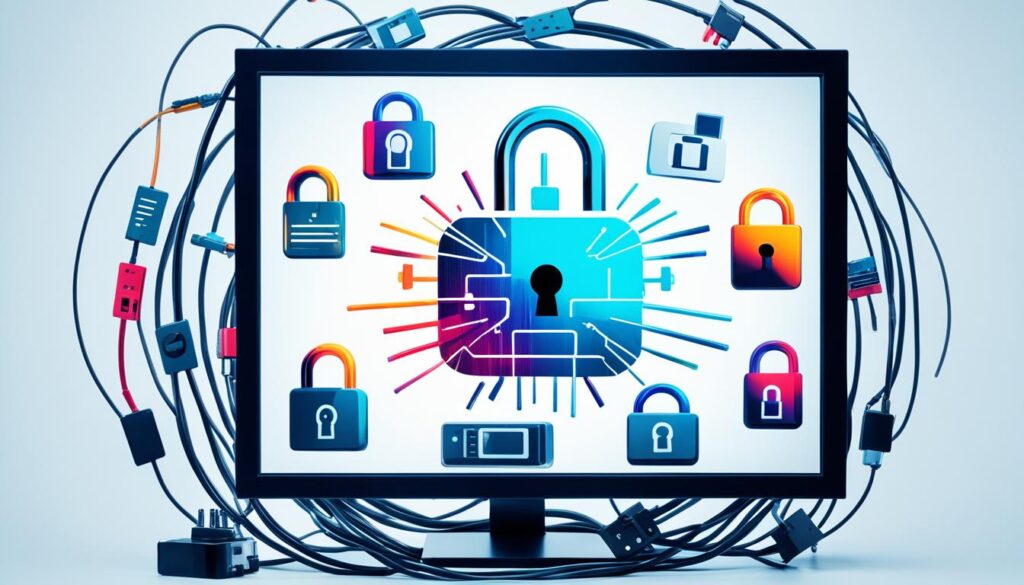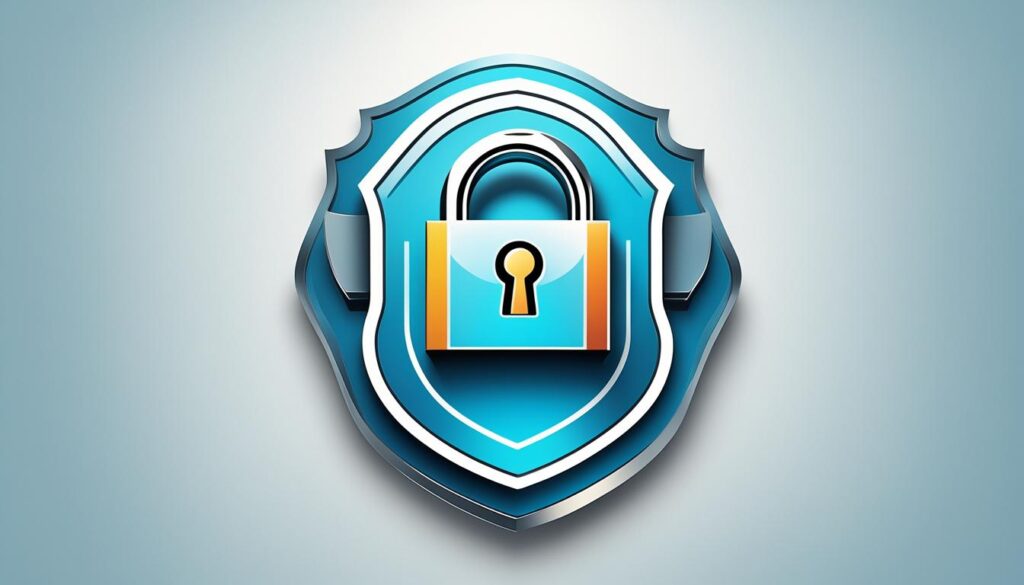Did you know that by the end of 2021, it is estimated that there will be over 1 billion IPTV subscribers worldwide? With the exponential growth of IPTV services, ensuring cybersecurity has become paramount. In this article, we will explore the essential cybersecurity measures needed to protect IPTV systems and user data from potential cyber threats.
Key Takeaways:
- Understanding the importance of IPTV cybersecurity in protecting user data.
- Identifying the specific security risks associated with IPTV systems.
- Implementing essential security best practices, including encryption and data protection.
- Exploring secure authentication mechanisms for enhanced IPTV security.
- Emphasizing the significance of network security measures and regular software updates.
Understanding IPTV Security Risks
As the popularity of IPTV services continues to grow, it is crucial to be aware of the security risks associated with this technology. This section will explore the specific vulnerabilities and threats that IPTV systems can face, highlighting the potential impact on data privacy and cybersecurity.
Data Privacy Concerns
With IPTV services, user data is constantly collected and stored to provide personalized recommendations and enhance the streaming experience. However, this data collection raises valid concerns about privacy. Unauthorized access to personal information, such as viewing habits and preferences, can lead to data misuse or even identity theft. It is essential for IPTV providers to prioritize data privacy and implement robust measures to protect user information.
Cybersecurity Threats
IPTV systems are susceptible to a range of cybersecurity threats that can compromise user data and disrupt the service. Malware attacks, such as viruses or ransomware, can infiltrate IPTV devices and networks, potentially causing data loss or financial loss. Phishing attacks, where malicious actors use deceptive tactics to trick users into revealing sensitive information, are also prevalent in the IPTV landscape. IPTV providers must stay vigilant and employ advanced security measures to mitigate these threats.

To gain a comprehensive understanding of IPTV security risks, let’s take a look at a comparison table:
| Security Risks | Description |
|---|---|
| Data Breaches | Unauthorized access to user data due to security vulnerabilities or inadequate data protection measures. |
| Malware Attacks | Infiltration of IPTV devices and networks by malicious software, potentially leading to data loss or system disruptions. |
| Phishing Attacks | Social engineering techniques used to deceive users into revealing sensitive information, such as login credentials. |
| Data Interception | Eavesdropping on IPTV streams to capture sensitive information, compromising user privacy. |
| Unauthorized Access | Illicit usage of IPTV services by unauthorized individuals, potentially leading to service abuse or financial loss. |
Understanding the various security risks associated with IPTV is crucial for both IPTV providers and users. By being aware of these vulnerabilities, appropriate security measures can be implemented to protect user data and ensure a safe streaming experience.
Essential Security Best Practices
When it comes to IPTV systems, implementing essential security best practices is crucial for protecting user data and ensuring a secure streaming experience. In this section, we will explore key measures that IPTV providers can implement to safeguard their platforms from cyber threats.
1. Encryption and Data Protection
IPTV encryption plays a vital role in preventing unauthorized access to user data. By implementing robust encryption protocols, providers can ensure that sensitive information remains secure and confidential. Encryption ensures that data transmitted between the server and client devices is scrambled and can only be accessed with the appropriate decryption key. This adds an additional layer of protection against potential breaches and cyber attacks.
2. Secure Authentication Mechanisms
Implementing secure authentication mechanisms is essential for verifying user identities and preventing unauthorized access to IPTV services. Providers should utilize secure authentication methods such as two-factor authentication (2FA) and biometric authentication to enhance user security. Two-factor authentication requires users to provide an additional verification step, usually in the form of a unique code sent to their registered email or mobile device. Biometric authentication utilizes fingerprints, facial recognition, or iris scans to confirm user identities, increasing the overall security of the system.
3. Network Security Measures
Ensuring network security is crucial to protect IPTV systems from external threats. Providers should implement network security measures such as firewalls, intrusion detection systems (IDS), and virtual private networks (VPNs). Firewalls act as a barrier, monitoring and restricting incoming and outgoing network traffic. Intrusion detection systems detect and respond to potential threats, alerting providers to any suspicious activity. Virtual private networks establish secure connections between client devices and the IPTV server, encrypting all data transmitted over the network.
4. Regular Software Updates and Patch Management
To maintain a high level of security, regular software updates and patch management are essential. Updating IPTV software and applications on a timely basis ensures that security vulnerabilities are addressed promptly. Providers should prioritize critical updates and thoroughly test patches before deployment to minimize the risk of disruptions and ensure smooth operation. By staying informed about security advisories and alerts issued by IPTV providers and software vendors, potential threats can be mitigated effectively.
Incorporating these essential security best practices will significantly enhance the security of IPTV systems, protecting user data and ensuring a secure streaming environment. By investing in encryption, secure authentication mechanisms, network security measures, and regular software updates, IPTV providers can establish a trusted and reliable platform that prioritizes the privacy and security of its users.
| Essential Security Best Practices | Benefits |
|---|---|
| Encryption and Data Protection | – Prevents unauthorized access to user data – Ensures confidentiality of sensitive information |
| Secure Authentication Mechanisms | – Verifies user identities – Prevents unauthorized access to IPTV services |
| Network Security Measures | – Adds a barrier against external threats – Detects and responds to potential security breaches |
| Regular Software Updates and Patch Management | – Addresses security vulnerabilities promptly – Minimizes the risk of disruptions |
Encryption and Data Protection
When it comes to IPTV, encryption and data protection are crucial for ensuring user data security. By implementing robust encryption protocols and data protection measures, IPTV providers can effectively safeguard user information from unauthorized access.
Encryption plays a vital role in protecting user data by converting it into an unreadable format that can only be deciphered with the correct decryption key. This ensures that even if the data is intercepted, it remains secure and inaccessible to unauthorized individuals. IPTV encryption uses advanced algorithms to encode user information, making it virtually impossible to decipher without the encryption key.
Various encryption techniques and protocols are employed in IPTV systems to ensure end-to-end security. These include symmetric key encryption, asymmetric key encryption, and secure socket layer (SSL) encryption. Symmetric key encryption uses a single key for both encryption and decryption, while asymmetric key encryption uses a pair of public and private keys. SSL encryption, on the other hand, establishes a secure connection between the IPTV server and the client device, encrypting the data transmitted between them.
Data protection measures are equally important in preventing unauthorized access to user data. IPTV providers should implement robust security measures at both the server and client levels. This includes strict access control mechanisms, user authentication processes, and secure storage of user information. By adhering to stringent data protection practices, IPTV providers can enhance user data security and minimize the risk of data breaches.

Overall, encryption and data protection are fundamental in securing user data in IPTV systems. By utilizing advanced encryption protocols and implementing robust data protection measures, IPTV providers can ensure the confidentiality and integrity of user information, maintaining the trust and confidence of their users.
Secure Authentication Mechanisms
Implementing secure authentication mechanisms is crucial to ensuring the integrity and confidentiality of IPTV systems. By verifying user identities and preventing unauthorized access, these mechanisms play a vital role in enhancing IPTV security.
One of the most effective authentication mechanisms is two-factor authentication (2FA). With 2FA, users are required to provide two forms of identification, usually a password and a unique code sent to their registered device. This additional layer of security significantly reduces the risk of unauthorized access even if the password is compromised.
Biometric authentication is another reliable mechanism that can be implemented in IPTV systems. By using unique biological characteristics such as fingerprints or facial recognition, biometric authentication provides a high level of security that is difficult to breach. Users can authenticate themselves using their own physical traits, making it convenient and highly secure.
Password management is also a critical aspect of secure authentication. Users should be encouraged to create strong, unique passwords for their accounts and avoid using the same password across multiple platforms. Passwords should be complex, incorporating a combination of uppercase and lowercase letters, numbers, and special characters. Regular password updates and avoiding common dictionary words or personal information can further enhance security.

Advantages of Secure Authentication Mechanisms
Implementing secure authentication mechanisms in IPTV systems offers several advantages:
- Enhanced data protection: Secure authentication mechanisms help safeguard sensitive user data from unauthorized access and potential breaches.
- Prevention of unauthorized account access: Two-factor authentication and biometric authentication provide an additional layer of security, preventing unauthorized individuals from accessing user accounts.
- Reduced reliance on passwords: By implementing biometric authentication, users can rely on their unique physical characteristics rather than solely relying on passwords, reducing the risk of password-related vulnerabilities.
- Convenience and user experience: While enhancing security, secure authentication mechanisms such as biometrics offer users a seamless and convenient experience, eliminating the need to remember complex passwords.
By prioritizing secure authentication mechanisms, IPTV providers can significantly strengthen the overall security posture of their systems and ensure a safe and trusted streaming environment for their users.
Network Security Measures
When it comes to safeguarding IPTV systems, network security measures play a critical role in preventing unauthorized access and protecting user data. By implementing robust security protocols, such as firewalls, intrusion detection systems (IDS), and virtual private networks (VPNs), IPTV providers can ensure the integrity and confidentiality of their network infrastructure.
Firewalls: Building a Secure Perimeter
Firewalls act as the first line of defense against potential cyber threats by monitoring and filtering incoming and outgoing network traffic. They create a secure perimeter around the IPTV system, selectively allowing or blocking specific types of communication based on predefined security rules. By employing firewalls, IPTV providers can prevent unauthorized access attempts and mitigate the risk of data breaches.
Intrusion Detection Systems (IDS): Identifying Threats
Intrusion Detection Systems (IDS) serve as a crucial component of network security by actively monitoring network activity and identifying potential threats or suspicious behavior. These systems rely on advanced algorithms and real-time analysis to detect anomalies that may indicate a security breach. By promptly alerting system administrators to potential threats, IDS helps expedite incident response and minimize the impact of security incidents on IPTV systems.
Virtual Private Networks (VPNs): Ensuring Secure Communications
Virtual Private Networks (VPNs) are a vital tool for securing communication channels within IPTV systems. By encrypting data traffic between interconnected devices, VPNs provide a secure and private connection, even when transmitting over potentially untrusted networks. This encryption ensures that sensitive user data remains confidential and protected from unauthorized interception and surveillance.
Network Monitoring and Threat Detection: Staying One Step Ahead
Constant monitoring and proactive threat detection are crucial elements of network security measures for IPTV systems. By leveraging advanced monitoring tools and threat intelligence, IPTV providers can identify and address potential security incidents in real-time. This enables them to detect and respond to emerging threats promptly, reducing the risk of prolonged network vulnerabilities.

| Network Security Measures | Benefits |
|---|---|
| Firewalls | 1. Prevent unauthorized access 2. Control network traffic 3. Block potential threats |
| Intrusion Detection Systems (IDS) | 1. Monitor network activity 2. Detect suspicious behavior 3. Expedite incident response |
| Virtual Private Networks (VPNs) | 1. Secure data transmission 2. Encrypt communication channels 3. Protect sensitive user data |
| Network Monitoring and Threat Detection | 1. Real-time incident detection 2. Proactive threat response 3. Minimize network vulnerabilities |
Regular Software Updates and Patch Management
Regular software updates and patch management play a vital role in ensuring the security of IPTV systems. By promptly applying software updates and patches, providers can address security vulnerabilities and protect user data from potential cyber threats.
Best practices for patch management include prioritizing critical updates to address the most severe vulnerabilities first. Additionally, it is essential to test patches before deployment to mitigate the risk of unintended consequences or system disruptions.
Staying informed about security advisories and alerts issued by IPTV providers and software vendors is equally important. These advisories provide valuable insights into emerging threats and recommended actions to maintain the security of IPTV systems.
The Importance of Regular Software Updates
Regular software updates are crucial for maintaining the security and integrity of IPTV systems. These updates often include essential security patches that address known vulnerabilities in software and applications.
By keeping software up to date, providers can ensure that any security vulnerabilities identified in previous versions are patched, minimizing the risk of exploitation by cybercriminals.
Furthermore, regular updates often introduce new security features and protocols that enhance the overall security posture of IPTV systems. These features may include improved encryption algorithms, stronger authentication mechanisms, and enhanced network security measures.
The Role of Patch Management
Patch management is a critical aspect of maintaining the security of IPTV systems. It involves the systematic process of identifying, testing, and deploying software patches to address security vulnerabilities.
Effective patch management requires providers to establish clear procedures and workflows for patch identification, evaluation, and deployment. It is crucial to prioritize critical patches that address vulnerabilities with a higher potential for exploitation.
In addition to applying patches promptly, it is essential to test them thoroughly before deployment to ensure compatibility with existing software and minimize the risk of system disruptions.
Staying Informed About Security Advisories and Alerts
Staying informed about security advisories and alerts is vital for IPTV providers to stay ahead of emerging threats and take proactive security measures.
Security advisories, issued by both IPTV providers and software vendors, provide important information about newly discovered vulnerabilities and recommended actions to mitigate associated risks.
By regularly monitoring these advisories, providers can stay informed about potential security risks and take the necessary steps to protect their IPTV systems and user data.
Ultimately, regular software updates and patch management are essential practices that help maintain the security and integrity of IPTV systems. By keeping software up to date and promptly addressing security vulnerabilities, providers can ensure a safer and more secure IPTV experience for their users.

| Advantages of Regular Software Updates and Patch Management: | Disadvantages of Neglecting Regular Updates and Patch Management: |
|---|---|
|
|
Choose Reputable IPTV Providers
When it comes to selecting an IPTV provider, it’s crucial to prioritize data security and privacy. Choosing a reputable provider not only ensures a reliable streaming experience but also safeguards your personal information from potential cyber threats.
To make an informed decision, conducting thorough research is essential. Take the time to read user reviews and testimonials, as they offer valuable insights into the provider’s track record and customer satisfaction. Look for reputable IPTV providers that have a strong reputation for prioritizing data security and privacy.
By opting for a provider with a proven commitment to data security, you can have peace of mind knowing that your personal information and streaming activities are protected.
The Importance of User Reviews
User reviews play a crucial role in helping you assess the reliability and trustworthiness of an IPTV provider. By reading reviews from other customers, you can gain valuable insights into their experiences with the provider.
Pay attention to reviews that specifically highlight data security and privacy. Look for positive feedback regarding secure streaming, data protection measures, and overall satisfaction with the provider’s commitment to user privacy.
Keep in mind that no provider is perfect, and certain negative reviews may be expected. However, pay close attention to any recurring issues related to data security or breaches, as these could be red flags to consider.
Choosing Providers with a Track Record of Data Security
When selecting an IPTV provider, prioritize those with a track record of prioritizing data security. Look for providers that offer robust encryption protocols and secure data storage mechanisms to protect your personal information from unauthorized access.
Reputable IPTV providers often have transparent policies regarding data collection, storage, and sharing practices. Take the time to review their privacy policy and terms of service to ensure they align with your expectations and requirements for data security.
Additionally, consider providers that are proactive in addressing emerging cybersecurity threats. Look for those that regularly update their systems and software to address known vulnerabilities and actively monitor their networks for potential risks.
Remember, choosing a reputable IPTV provider is key to ensuring the security and privacy of your personal data. Conduct thorough research, read user reviews, and select a provider that prioritizes data security to enjoy a safe and reliable streaming experience.
Use Secure Networks
When accessing IPTV services, it is crucial to use secure, password-protected networks to safeguard your data and protect against cyber threats. Connecting to public Wi-Fi networks may expose your IPTV streaming activities to potential risks and data breaches.
Public Wi-Fi networks are often vulnerable to hackers who can intercept and gain unauthorized access to your sensitive information. By using secure networks, you can significantly reduce the chances of falling victim to such cyber attacks.
Secure networks, such as password-protected home networks or virtual private networks (VPNs), provide an added layer of encryption and security, ensuring that your IPTV streaming activities remain private and protected. VPNs, in particular, establish a secure and encrypted connection between your device and the IPTV server, making it virtually impossible for hackers to intercept your data.
By prioritizing the use of secure networks, you can enjoy IPTV services with peace of mind, knowing that your data is protected from potential threats.
Conclusion
Ensuring the cybersecurity and data protection of IPTV systems is crucial in safeguarding user data and privacy. Throughout this article, we have explored the essential security best practices for IPTV, shedding light on the importance of encryption, secure authentication, network security measures, regular software updates, and choosing reputable IPTV providers. By implementing these measures, IPTV providers can enhance user trust and confidence in the platform.
By prioritizing IPTV cybersecurity, providers can mitigate the risks of data breaches and unauthorized access, protecting sensitive user information. It is essential to stay informed about emerging security threats and proactive in updating security protocols to address potential vulnerabilities.
With the implementation of IPTV security best practices, providers can create a safe and secure streaming experience for users, reaffirming their commitment to data protection and privacy. By establishing stringent security measures, IPTV services can thrive and build long-lasting relationships with their user base.
FAQ
Why is cybersecurity important for IPTV systems?
What are the specific security risks associated with IPTV?
What are some essential security best practices for IPTV systems?
How does encryption protect user data in IPTV systems?
What is the importance of secure authentication mechanisms in IPTV systems?
How do network security measures protect IPTV systems?
Why are regular software updates and patch management important for IPTV systems?
How can I choose a reputable IPTV provider that prioritizes data security?
Why is it important to use secure networks when accessing IPTV services?






